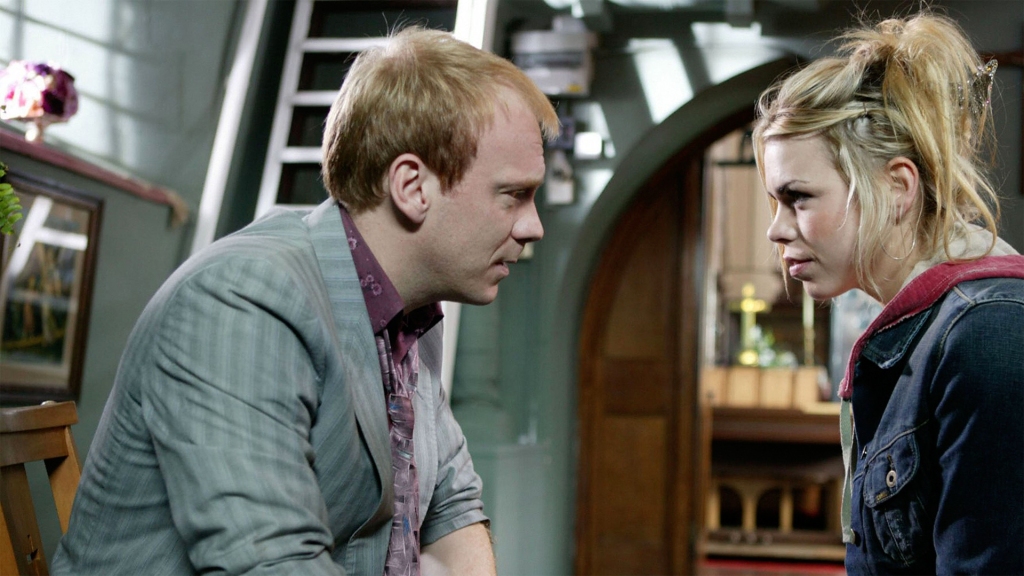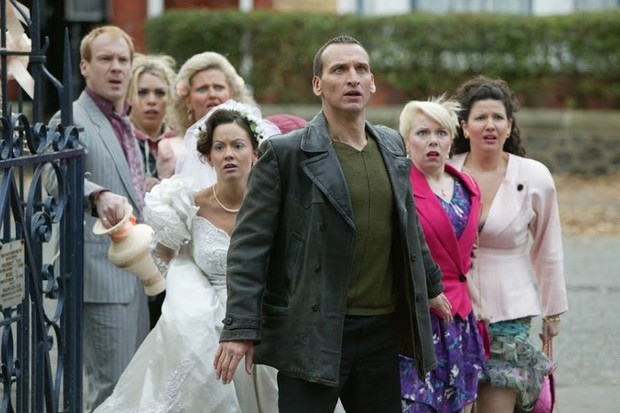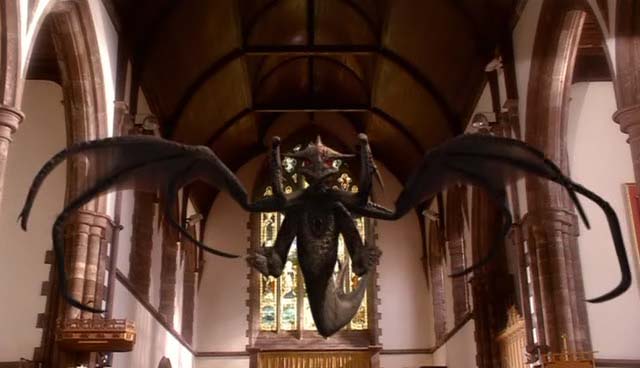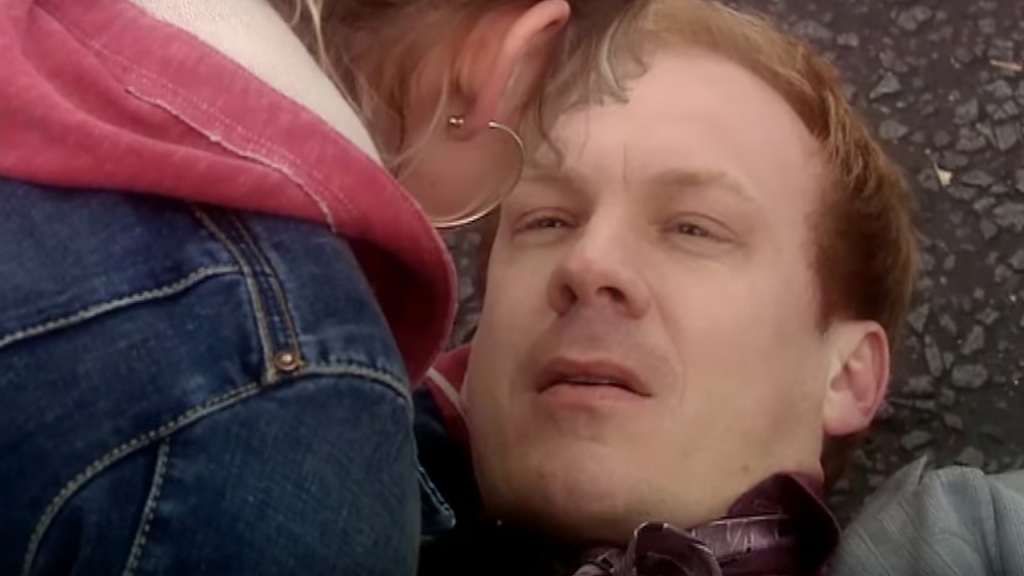
Peter Alan Tyler my dad. The most wonderful man in the world. Born 15th September 1954.
It is 2005, ‘Doctor Who has been off screen, barring the 1996 TV Movie and a few repeats for 15 years. A generation had grown up without knowing what a TARDIS or Daleks were and the British TV schedules had been bare of mainstream sci-fi and fantasy for quite some time. When Russell T Davies was commissioned to create a new series of the show in 2003 – he was specifically asked by Jane Tranter (Controller of Drama at the BBC) to create his own version of the show. Russell had become known for high quality ‘popular’ drama – ‘Queer as Folk‘, ‘Bob and Rose‘ and probably most relevant to ‘Doctor Who’ (his BBC Children’s series aside) – his high concept series for ITV – ‘The Second Coming‘, concerning the possible return of Jesus Christ in Manchester. He was tasked with creating a popular drama series akin to the then modern series ‘Buffy’ or ‘Smallville’, where the Sci-fi and fantasy elements were balanced against the more ‘soapy’ elements.
Series One as a whole is an interesting balancing act between not scaring off a potential new audience with overly complex Sci-Fi concepts and jargon, building an audience no longer used to science fiction on BBC1, whilst at the same time attracting and retaining those who were watching for exactly that. It has to be viewed through that lens and this context is important to a number of stories from that series. ‘Father’s Day’ fits perfectly in here in conception – a family drama, rich in emotion, with people and relationships that we can instinctively understand, but also a story that can only really be told in a sci-fi/fantasy context, with the attendant time travel and paradoxes. It melds ‘Doctor Who’ and the popular drama’s of the time – not soap especially – more something that Jimmy McGovern, Paul Abbot or Russell himself would have produced. Clocking Off with time paradoxes and inter-dimensional monsters. It is something that Russell pulled off with Second Coming – mixing the uncanny and the ordinary. It is something that the show hadn’t really attempted before and so it feels fresh, whilst also acting as a pathway into the new series for a wider audience, which was maybe less tolerant or sure of the sci-fi elements.
While the show had been away during ‘The Wilderness Years’, three main fictional strands had kept it alive. The DWM comic strip, Big Finish (from 1999 onwards) and the Virgin New Adventures books (later BBC books) from 1992. The star writer of the Virgin New Adventures had been Paul Cornell – an author who had managed to move the show in a slightly different direction, broaden what it could be and in the likes of ‘Love and War‘ and ‘Human Nature‘ write stories that had a great emotional beating heart. He had even managed to introduce Russell to the range, to write his sole contribution ‘Damaged Goods‘. In short, once Russell realised he had 13 episodes to write, Paul was just the sort of person he wanted to write one of the remaining episodes and he had one particular story from the original series pitch document in mind.
Rose’s Father or Wounded Time
Russell gave Paul Cornell an outline for an episode of the returning series (‘Rose’s Father‘, later renamed ‘Wounded Time’), in which Rose would go back in time and meet her deceased father, seeing him die time and time again. Pete’s story would be told be the people who knew him. Draft after draft followed (Terrance Dicks has a few things to say about this!). In the end I’m not entirely sure who wrote what, but I do know that the episode that ensued feels authentically like both Paul’s voice and Russell’s, which is no mean feat. It is a perfect melding of ‘Doctor Who’ and high quality popular drama and it is very series one.
In the Series 1 script book, Paul has the following to say about the episode:
‘I once had a dream about my Dad. Men were being drafted into the army again, and my Dad told me that he would never let them take me. That I didn’t have to go if I didn’t want to. That he’d put his life before mine. I knew he would die in my place if he ever had the chance. That makes him absolutely special and completely normal for a father at the same time’
He also talks rather movingly about his father’s wartime experiences in Burma and him reading the Target books of Terrance Dicks to a young Paul when he was ill. Paul’s relationship with his own father suffuses this story and again makes him the perfect person to write this and Russell is the perfect person to oversee it.
“Father’s Day‘ certainly benefits from its placement in the running order for the series, not just in narrative terms, but also in terms of the quality of the production. By this point, the Series One production line looked to be in full flow, having put a lot of the initial production issues in block one behind it. Joe Ahearne was ensconced as the Director of Favour and Cardiff busy producing a run of excellent stories – Dalek, Father’s Day, Empty Child, Parting of the Ways. Ahearne’s direction and the performances of the leads are all assured and confident – the tonal issues of that first block of stories (‘Rose, ‘Aliens of London‘) seemingly banished. Even the look and feel of the show has improved and works brilliantly here. The grading and the filming in November, leaves on the ground, give it an autumnal and slightly funereal feel. It works thematically, even though it is set around a wedding, really it is a funeral eulogy to Rose’s lost father.
The story so far…

We come into this story already knowing Rose and her family – Jackie and Mickey and some of their backstory. So, even though we have travelled back in time, we are entering a familiar world. For those of us who remember the 1980’s it is an exercise in nostalgia – whether for the ‘No Third Term for Thatcher’ posters or possibly for the fashion and hairstyles of the time, with references in Pete and Jackie’s wedding to the 1981 Royal Wedding. For those who don’t remember the time – well it is an opportunity for youngsters to laugh at what Mum and Dad used to look like – just as Rose herself does. So the ‘near history’ setting is quite astute, a ‘Doctor Who’ 80’s night.
The ‘story so far’, for those who might have missed it is set up perfectly in the opening scenes, where Jackie talks to her young daughter – showing her the family photo album. This is interspersed with the older Rose asking the Doctor to take her back in time to see her father:
JACKIE: Come here, Rose. Come here. Who’s that? It’s your daddy. You weren’t old enough to remember when he died. 1987, 7th of November. Do you remember what I told you? The day that Stuart Hoskins and Sarah Clarke got married. He was always having adventures. Oh, he would have loved to have seen you now.
JACKIE: I wasn’t there. Nobody was. It was a hit and run driver. Never found out who. He was dead when the ambulance got there. I only wish there’d been someone there for him.
ROSE: I want to be that someone, so he doesn’t die alone.
It is done with brilliant economy and from that point on we find out everything we need to know about Rose and Jackie and Pete and their relationships as the story unfolds.
An Ordinary Man

I don’t think that the programme had ever before been either so emotional or so honest in its portrayal of love and loss and family. We’ve seen something of the impact of the loss of Pete Tyler on the lives of Jackie and Rose in the introduction, providing the lead in to Rose asking the Doctor to take her back in time to see him. This is an aspect that links in with the ending of ‘Rose’, where at she originally joins the Doctor – as she first turns him down and then agrees when he returns and mentions that it can time travel. What isn’t so clear is why the Doctor agrees to take her back to this dangerous point in her personal history. In those scenes where they repeatedly go back to the same point so that she can speak to Pete, he consistently lectures her on the ethics and responsibilities of time travel – but in the end it is he who facilitates her saving Pete’s life – pushing him away from the oncoming car that was to end his life. The reasons why he does this are somewhat lost and it is an area that isn’t really explored, almost as if there is a missing scene. Is he trying to impress her, just grateful for everything she has done for him – helping him to get over his trauma and survivors guilt at the end of the Time War? Whatever the reason, things don’t quite pan out the way she expected when she finally meets Pete.
Pete’s status as a hero arises out of his own fallibility and ‘normality’. He is an ordinary man, a bit of a loser, but with a good heart – a bit of a let down to Rose, not even tall enough to match her idea of what he would be like. He is brilliantly played by Shaun Dingwall here – a normal, everyday, flawed person. The story has an honesty, it doesn’t pull its punches with regard to the state of his relationship with Jackie, he has possibly strayed, she is quite heartless at times – we see the other side of her lovable, down market comedy mum and the effect of this on Rose – we see it through her eyes. This also contrasts nicely to the pathos of her loneliness without Pete or Rose, which we will later see in Love and Monsters. Jackie’s flat is alive with the evidence of the myth of Pete, his failures and triumphs so mundane (the bowling trophy with a promise of a trip to Didcot) – but to Rose this mythology is as impressive as the Doctor’ has to offer. Pete’s ‘ducking and diving’, scratching a living from ill-thought through schemes and his health drinks apparently was also based on Paul’s Cornell’s father’s own attempts to make a living, but it serves to give Pete’s later sacrifice a nobility.
The setting of the wedding cleverly brings the strands of the Tyler’s life together – their friends, young Mickey – it also provides a perfect setting to show the less than perfect aspects to their relationship. More importantly, as with a lot of series one, it grounds the high concept sci-fi elements very much in the everyday and normal. All aimed at the widest possible audience. Even Pete as a character is coded as an archetype familiar to viewers – that of Del-Boy, the lead in ‘Only Fools and Horses‘ – a BBC sitcom, which at peak had nearly 25 million viewers. He is a character, like Jackie, that the audience instinctively know. Whilst the narrative is constructed around the uncanny – the Reapers and the paradoxes inherent in changing time, the presentation is bedded in the familiar and normal. We even have the Doctor celebrating the life ordinary – bride-to-be Sarah, meeting her future husband Stuart outside of a night club and almost lamenting that he has never had a life like that. This very much feels like something Russell would have added – it also very much suits Christopher Eccleston and feels much more like the sort of work he would want to be involved with.
Wounded Time

I haven’t really commented too much on the sci-fi elements of the story, but there is a reason for that, they are not what I think of when I think about the story. However, this aspect, the time paradox caused by Rose saving Pete and later touching her future self and the Reapers arriving to ‘seal the wound‘ work really well. These were added later in the evolution of the script, Russell had conceived it as no monsters, Doctor-lite, CGI-lite, cheaper episode. However, Jane Tranter had asked for there to be more monsters added across the season, thinking it lite in that regard. The reapers at one point where a more literal representation of the ‘Grim Reaper’ – but abstracting them somewhat from that works better. The siege of the church provides the action and jeopardy, in a story that would be otherwise a bit lacking in that regard. The balance works well I think. Amongst the emotional, family thread we have the temporal paradoxes, the ’empty’ TARDIS and the shots from the Reapers POV as the inhabitants of the area around the church disappear. The Doctor is back-grounded slightly here in favour of the Tyler family story – it was originally intended as a Doctor-lite episode to give the lead a break, but it still works rather well.
Shelter from the Storm
If the setting of a wedding is astute from the perspective of bring together the Tyler’s and their extended friends and family, the location of much of the action within the church itself is symbolic. Paul Cornell is a practicing Christian, something which permeates his writing and his wife is a vicar. Interestingly though, the original setting for most of the action was a pub. It was the very much non-religious Russell T Davies, who suggested the church as a space in which all of the Tyler’s friends could all be brought together and the wedding as justification. This is one of a series of creative decisions he would make across his time as showrunner that would use religious iconography – angels, the hymn in ‘Gridlock’, Satan, resurrections and a series of god-like representations of the lead characters. The re-purposing of religious themes and iconography for a secular purpose.
The church here is very much a sanctuary – a safe place in the eye of hurricane. Its very age, as much as the stone walls a barrier to the Reapers and the chaos of the world outside. You could make an explicit connection between this story and Christianity. A man born to relatively humble circumstances, who gets to live beyond his initial death and sacrifices himself to save the world. It would be easy to construct a review around that. However it is so rooted in the ordinariness of Pete Tyler and his sacrifice for his family, that it never feels quite like that. Rather a secular piece, with a religious theme should you want to look for that.
Who am I?
So to the ending. The scenes between Pete and Rose, as he realises who she is and then tries to tell Jackie are quite beautiful. For Pete, meeting the grown-up Rose, the daughter who he will never see, is a moment to put aside his failures and disappointments, to grow up and take responsibility – to become a father in fact:
I never read you those bedtime stories. I never took you on those picnics. I was never there for you.
But I can do this for you. I can be a proper dad to you now. I’ve had all these extra hours. No one else in the world has ever had that. And on top of that, I got to see you. And you’re beautiful. How lucky am I, eh? So, come on, do as your dad says. You going to be there for me, love? Thanks for saving me.
‘No love, I’m your Dad. Its my job for it to be my fault’
‘Who am I love?’ ‘My Daddy’
These lines could sound quite cliched, but they are beautifully played here and get me every time I watch this. Instead of Pete lamenting his own fate, he treasures those extra hours with his daughter – the gift, albeit unwittingly given to both of them by. the Doctor. How many people wish for that – a bit of extra time with a loved one to tell them everything you wanted to say in life or a peak ahead to your child’s future to know that despite anything that happens to you, that they will be alright? It is simple, emotional and truthful.
I remember Paul Cornell saying that as Pete ran out to his death, he wanted the St Etienne song ‘Hobart Paving’ to play. I can’t say how much I approve, it is beautiful and one of my favourites. I’m listening to the “Van Dyke Parks arrangement’ version as I type this. With its refrain of ‘Don’t forget to catch me, don’t forget to catch me…’ it is rather appropriate. Murray Gold though provides an excellent score for this story – underscoring the emotional beats perfectly.
Again, in those final scenes, the ordinariness of one man being run over by a Vauxhaul Chevette contrasts with the sacrifice that Pete makes for his daughter and her world. One ordinary man seals a wound in time, brings back those who have been killed and banishes the Reapers. In doing so he saves the future for his wife and child.

The story nicely wraps around to the opening scenes between Jackie and the young Rose, with one particular change. It is a wonderful piece of symmetry.
He stopped, he waited for the police. It wasn’t his fault. For some reason, Pete just ran out. People say there was this girl, and she sat with Pete while he was dying. She held his hand. Then she was gone. Never found out who she was.
This coda of time being subtly changed and Pete having someone with him, to hold his hand as he dies, is rather like the dedication to Amy by Van Gogh in ‘Vincent and the Doctor’. We don’t see the funeral or the mourning, we don’t really need to as we have already seen the impact of Pete’s loss on the lives of both Jackie and Rose. We’ve seen the future he helped to save.
I’ve watched Father’s Day many times, although it gets me every time, I can’t quite recapture the emotional gut punch of watching it for the first time. I remember looking around the room and everyone, myself included was in floods of tears. The show was never really quite like this again, there are quite a few times that it has shamelessly tugged at the heartstrings, but never again was it all quite so ordinary and quite so perfect.
Coda
I originally wrote this review in 2016, which was a been a pretty bad year for many people – some seriously dispiriting world events and a plethora of beloved celebrities deaths, including some amazingly talented people. From a personal perspective, I had also just lost my own father to cancer after a very difficult, heartbreaking year watching him slowly die and writing his eulogy over and over again in my head.
My Dad, a bit like Paul’s or like Pete would have done anything for me and my Sister. He would have taken the same hit for either of us and he’s probably the only person that I will ever know who would. Thanks to Paul Cornell and Russell T Davies, for summing all of this up beautifully in what should be just a silly old British science fiction programme from my childhood, but which means so much more than that.